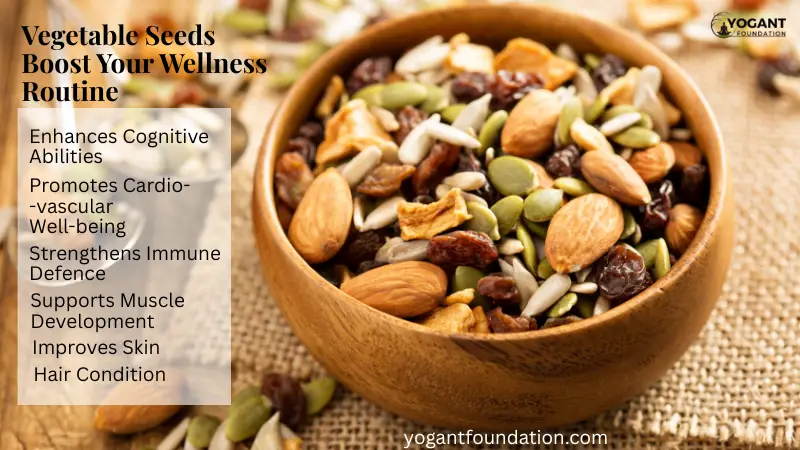Vegetable Seeds : A nutritional supplement with significant benefits
Vegetable, we often think of lush greens, colorful roots or delicious fruits cucumbers or tomatoes. We often overlook the seeds which are the humble beginnings of these healthy plants. The vegetable seeds is often overlooked they’re extremely beneficial. They’re full of vital nutrients, vitamins and minerals. Also, they are rich in nutritious fats and protein derived that comes from plant sources.
Consuming them cooked, raw or as salads or smoothies can provide many benefits to your health. These foods can dramatically boost your general well-being.
What are seeds from vegetables?
Vegetable seeds are reproductive elements that create new plants. Certain seeds, for instance the ones from cucumbers, pumpkins and broccoli aren’t just edible, it are loaded with nutrition. Some seeds are mostly grown for plant cultivation, they can be eaten they are prepared properly.
As opposed to the fruit seeds, such as the ones found in apples and papayas the majority of seeds from vegetables are wholesome and safe to consume. Additionally, they provide health benefits in a variety of varieties.
Below are a selection of most famous examples:
The seeds are pumpkins.
Sunflower seeds
Cucumber seeds
-Squash seeds
Broccoli as well as the cabbage seeds (often utilized in the process of of growing)
The seeds of the radish
Fenugreek Seeds (commonly utilized for their taste and nutritional value)
Nutritional Profile of Vegetable Seeds
Despite being small, they contain a lot of nutrients and offer numerous health benefits. That’s what makes them distinct:
1. High Protein Content
Many seeds, including pumpkin seeds and sunflower contain high amounts of the protein of plants. These are excellent choices to those on vegan or vegetarian diets.
2. Beneficial Fats
They’re rich in omega-3 and Omega-6 fats. They play a major role to play in reducing the effects of inflammation and improving brain and heart health.
3. Abundant Fiber
Seeds are rich in fiber. This aids in digestion and overall digestive well-being. This can help ease constipation as well as increase metabolic rate.
4. Rich in Essential Micronutrients
The vegetable seeds provide a wealth of essential minerals, which includes:
Magnesium is a vital component of muscles and nerve functions.
Zinc is an extremely potent mineral that boosts the immune system.
Iron is essential for red blood cell growth
Calcium is vital for bone health
5. Antioxidant Properties
The seeds of broccoli and radish are rich in antioxidants, such as Sulforaphane. They can help fight free radicals, and also lower the chance of developing cancer.
7 Super Healthy Vegetable Types of Seeds to eat
1. Pumpkin Seeds (Pepitas)
The healthy seeds are high in magnesium, zinc, along with protein.
They benefit cardiovascular health, strengthening the immune system and encouraging better sleep.
They also play an important function in maintaining the health of your prostate and maintaining hormone equilibrium. The seeds of pumpkin can be consumed fresh, baked and added to smoothies and salads. They’re a nutritious and healthy addition to your food regimen.
2. Sunflower Seeds
High in selenium, vitamin E as well as beneficial oil in sunflower seeds. They are great for reducing inflammation, improving the appearance of skin, and also boosting your immune system. Delicious nutty flavors and a delicious crunch are ideal snacks or toppings on salads, yogurt or oatmeal. These are the ideal selection for those looking for radiant health and beautiful skin.
3. Cucumber Seeds
Cucumber seeds are usually not considered. They’re full of antioxidants, fiber, and anti-inflammatory properties.
They aid digestion, eliminate the body of toxins and help regulate blood sugar levels. Making smoothies with cucumbers, or eating them fresh will keep you well-hydrated. It can also aid in the digestion process and help improve your skin’s health.
4. Fenugreek Seeds
Small, yet powerful seeds are high in iron, fiber as well as phytochemicals. They aid in controlling the blood sugar level, relieve menstrual cramps, as well as boost the production of milk in nursing mothers.
They are slightly bitter in flavor. It is possible to soak them in water for a few hours. It is also possible to add them into food items. Effective means to increase the digestion and metabolism.
5. Broccoli Seeds (Sprouted)
Broccoli seeds planted have high levels of Sulforaphane. It is an antioxidant that is known for its anti-cancer and cleaning properties. They help in the functioning of the liver, decrease inflammation, and encourage the renewal of cells.
Include them in salads, wraps and smoothies or juices. They will improve your immunity and aid in cleansing your body.
6. Radish Seeds (Sprouted)
If sprouted, the seeds of radish can be an excellent source for cleansing the liver as well as assisting in digestion. They are rich in vitamins A, B and C, they also include vital enzymes. They aid in eliminating toxic substances and improve metabolism. Their vibrant flavors boost the nutrition content of sandwiches, soups and salads.
7. Squash Seeds
The seeds of squash are rich in omega-3 fats, iron as well as antioxidants. They aid in boosting your heart health and brain, increase the function of your brain, as well as provide long-lasting energy.
It is easily roasted and prepared to be seasoned. It makes them delicious and tasty snack. They lower cholesterol as well as protect against damage caused by oxidative.
Vegetable Seeds. other seeds (Like Nuts and Grains)
| Type | Benefits | Nutrient Highlight |
| Pumpkin Seeds | High in zinc, immune-boosting | Protein, Magnesium |
| Sunflower Seeds | Great for skin, reduces inflammation | Vitamin E |
| Fenugreek Seeds | Aids digestion, controls sugar | Iron, Fiber |
| Broccoli Seeds (sprouted) | Anticancer, detoxifying | Sulforaphane |
| Radish Seeds | Supporting liver and cleansing | Antioxidants |
| Squash Seeds | cholesterol | omega-3 fat acids |
| Cucumber Seeds | Blood sugar level | Antioxidants and fiber |
While seeds like sesame, chia or flax are known to be sought-after, vegetable seeds are equally efficient and can be more affordable and easy to plant at home.
Top Health Benefits of Vegetable Seeds
1. Enhances Cognitive Abilities
The seeds that are high in omega-3 fats and magnesium are able to improve concentration and memory. Pumpkin seeds are a great illustration of these seeds. They aid in improving brain function. They are especially Beneficial to professional students, professionals in the workplace and older citizens.
2. Promotes Cardiovascular Well-being
The mix of fibre along with beneficial fats and antioxidants that are found in seeds can help with:
– Lowering cholesterol levels that cause harm (LDL)
– The goal is to increase the beneficial cholesterol levels (HDL)
– Reducing blood pressure
– Preventing heart disease
3. Strengthens Immune Defence
The seeds of sunflower and fenugreek are high in selenium, zinc, and vitamin E.
They aid in strengthening the immune system and boost your body’s capacity to fight from diseases.
4. Supports Muscle Development
Vegetable seeds are a natural source of amino acids and protein that aid in the recovery of muscles and development. This is why they are the best option for a post-workout snack.
5. Improves Skin and Hair Condition
Vitamin E along with the fats that are essential in these seeds promote:
– Radiant skin
– A face that is dilated and wrinkles
– Lustrous, healthy hair
– Reduced hair loss
How to Add Vegetable Seeds to Your Diet
Making the healthy seeds part of your diet is simple. Here are some ideas:
Snacks: Eat sunflower or pumpkin seeds in raw form, or roast the seeds.
for Salads and Smoothies: Add the seeds to your salads or blend them into your smoothies for a boost of energy.
Seed Sprouts: Grow sprouts of radish alfalfa, and broccoli seeds. They are a nutritious and delicious dressing for salads.
Seed Powder: Seeds into powder that is fine. It can be mixed in soups, curries and Chapati dough.
Spreads and chutneys made from seeds. Use seeds. The seeds are roasted to make tasty spreads or classic Indian Chutney.
Germinated or Soaked Seeds: Soaking seeds, such as Fenugreek for several hours helps reduce bitterness, and also assists to ease digestion.
Incorporating this nutritious seed is simple. Here are some tips:
Snacks: Try sunflower or pumpkin seeds in a raw form or roast them.
in Salads and Smoothies: Add sprinkles of seeds into your salads, or mix the seeds into smoothies to give additional energy.
Seed Sprouts: Plant sprouts out of radish, broccoli or alfalfa seed to make a healthy and crunchy garnish on salads.
Seed Powder: Convert seeds into fine powder. You can then mix it into curries, soups or even the chapati dough.
Chutneys and Spreads of Seeds Make use of seeds that are roasted for a tasty spread, or an old-fashioned Indian Chutney.
Soaked or germinated seeds The act of soaking seeds such as the fenugreek over a period of time not only lessens bitterness, it improves digestion.
Although seeds such as chia, sesame, flax and chia are widely known, seeds that come from vegetables are beneficial. They tend to be less expensive and more easily grown at home.
Can You Grow Your Own Vegetable Seeds?
An increasing number of health conscious individuals are cultivating microgreens or sprouts in their own kitchens. This is due to:
Economical
Free of chemical
Healthy and fresh, packed with nutrients
Incubate the seedlings in water, place them on a cloth or tray that is a good place to start sprouting. Within 5-7 days, you’ll harvest healthy sprouts that you can eat.
Precautions: Using Vegetable Seeds
The seeds of this vegetable are beneficial to health. It is vital to be aware of the following:
1. Pay attention to your food intake If you consume too much the amount of food consumed can trigger digestive discomfort along with allergic reactions.
Allergic awareness: When are deciding to give a shot for first time, you should start by taking a tiny quantity. It will allow you to determine the severity of any reactions.
3. It is important to properly prepare. Roasting or souring the seeds will help eliminate nutrient blockers, such as phytic acids. Acids can alter the way minerals are taken in.
Conclusion: Small Vegetable Seeds, Beneficial Impact
The seeds of vegetables are loaded with nutrients and vitamins. They are a great way to improve health and increase your energy levels.
What ever your objectives regardless of you’re looking improve your the health of your heart, increase endurance, control hormones or even increase the amount of plant protein.
The seeds are the most practical and easy solution.
Incorporate them into your daily diet, and make sprouts at the counter in your kitchen, or have them for snacks throughout your time of the day. Your body will feel grateful for this.
Key Points to Remember
It is also known as sunflower, pumpkin and radish are rich in protein, fiber, and minerals.
They can positively affect the functioning of the heart, brain health, digestion, and hormonal balance.
It is easy to integrate them in the menu for your day including snacks, drinks and salads.
It is possible to grow it at home, either in microgreens, or in the form of sprouts.
Healthy and nutrient-rich if you take it in moderate quantities.




Pingback: Meaning of Savasana and Why You Should Do Corpse Pose
Pingback: Basil Seeds vs Chia Seeds: Settling the Superfood Debate
Pingback: Complete Guide to The Gayatri Mantra
Pingback: Benefits Of Kiwi During Pregnancy Complete Guide for Moms